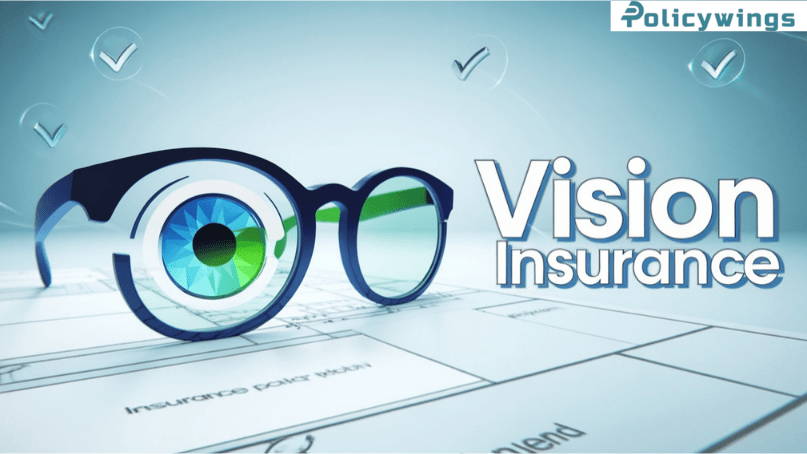Do you find yourself experiencing issues straining to read text on a computer screen or traffic signs at a distance? Not surprising that issues of vision are becoming more and more common with the rise of incidence of nearsightedness disorders and longer duration of visual fixations with digital devices . With the rising costs of eye tests, glasses, and corrective lenses; the question at hand is actually if you can even afford not to have vision insurance.
Table of Contents
ToggleWhile health insurance is common knowledge, many people don’t realize that vision insurance exists to help with the everyday costs of eye care. But is it worth it? Is this a smart investment for you or just another expense to worry about?
Read the blog till the end to understand in detail about eye care insurance plans in India.
What Is Vision Insurance?
Vision insurance isn’t your typical health insurance. Instead, it’s more of a type of plan that covers average eye care expenses. It’s more like having assistance for routine eye exams, eyeglasses, contact lenses, and sometimes even procedures like LASIK.
But here’s the rub: most people don’t even know that it exists. It’s one of those hidden gems in the insurance world. A good vision insurance plan can cover everything from regular eye exams to discounts on glasses or contacts. And with vision problems becoming increasingly common, having this type of insurance might be more important than you think.
For example, do you know the American Optometric Association estimates almost 1 out of 4 Americans has an undiagnosed vision condition? Think of the consequences of not catching as easy an error as a misplaced prescription or indications of an additional issue that turns out to be serious—now there might be worse vision complications in the future.
How Does Vision Insurance Work?
Suppose you’re thinking about buying a vision insurance policy. Here’s what to expect.
When you enroll in vision insurance, you’ll be paying a monthly premium. The insurance will pay for the price of a range of expenses in return. They may be things such as discounted eye exams, glasses, or contacts. Some plans also pay allowances for certain things such as frames, although not always.
Let’s say you require new glasses. Without coverage, you could be paying ₹25,000 or more for frames, lenses, and an eye exam. With vision insurance, you might only be paying a fraction of that due to discounts or an allowance that pays part of the fee.
But not everything is covered. Remember that vision insurance is not meant to pay for treatment of eye illness. Therefore, if you get an eye disease such as glaucoma or cataracts, that will probably be under your standard health insurance. Vision insurance is aimed at preventive care and routine procedures such as eye exams.
What Does Vision Insurance Cover?
That’s where vision insurance really shines: it helps with the basics, getting your eyes tested on a regular schedule, and having the right gear to be able to see properly.
Routine Eye Exams
Eye tests are necessary to maintain your eyes healthy and can catch issues when they are still minor. Vision insurance covers such tests, usually in full. Check-ups will also diagnose such conditions as glaucoma, which, if undiagnosed, can damage your vision forever.
Corrective Lenses
If you wear contacts or glasses, you’re likely aware of how costly it can be. Vision insurance frequently provides a discount or an allowance for corrective lenses, which can save you a great deal of money. This is particularly beneficial when you need to replace outdated lenses or purchase new frames.
Frames
Though no plan covers the entire cost of frames, many offer discounts or allowances toward a new pair. You may receive a ₹8,000 allowance, which can significantly help cover the expense of fashionable, high-quality frames.
Contact Lens Fittings
The contact fitting process can be finicky. You have to get the right type and fit, and sometimes that means a trip to an eye care specialist. Vision insurance can assist with the cost of these fittings, so you can get the proper contacts without going broke.
Discounts on LASIK Surgery
Some plans even offer discounts on LASIK or other corrective surgeries. If you’ve been thinking about LASIK, this could make the procedure more affordable.
Why Should You Consider Vision Insurance?
Caring for your eyes isn’t only necessary—it costs an arm and a leg. Just a basic eye examination by itself can range from ₹8,000 to ₹16,000. And then there’s new glasses or contacts, another ₹16,000 to ₹33,000, and maybe more if you want specialty lenses or designer frames.
But the thing is—vision insurance does help. Not only will it pay you back in the long run, but it will also get you regular check-ups. Actually, those with vision insurance are 25% less likely to be plagued with serious vision issues because it’s early detection that matters. A small investment today will preserve your eyesight as well as your budget in the long run.
Convenience is another reason to think about vision insurance. Most vision plans provide access to a pre-existing network of providers and doctors, making it easier to have your eyes examined and your prescription filled. No more searching for bargains or trying to sort through complex billing!
How to Choose the Right Vision Plan
So, how do you know if vision insurance is worth it for you? Here are some things to consider:
- Coverage Options: What exactly does the plan cover? Make sure the services you need are included, whether it’s exams, corrective lenses, or frame allowances.
- Provider Networks: Some plans limit you to in-network providers, while others allow you to choose any eye doctor. In-network options typically offer lower costs.
- Premiums: The monthly cost of vision insurance can vary widely. Make sure you choose a plan that fits your budget.
- Deductibles and Allowances: Understand how much the plan will contribute toward your expenses and how much you’ll need to pay out-of-pocket.
The Bottom Line
Vision insurance is not a luxury, but a requirement, if you depend on your eyes to work, to learn, or to survive in general. Vision insurance provides a wonderful list of benefits that is well worth the investment, from catching a problem early on, to saving yourself money on eyeglasses, to getting rebates on eye surgery.
Still skeptical? Think about this: the average person will spend over ₹33,000 a year on eye care without insurance. But vision insurance might reduce that by at least half. And if you wear contacts or glasses, it could save you even more.
In the end, vision insurance isn’t simply about paying for a possible eye issue; it’s about safeguarding your vision to see clearly—and ensuring the cost of keeping your vision at its finest drains your bank account.
So, what is the news? Are you prepared to invest in your eye health? Don’t wait until you need glasses. Look into your options today and see just how much a vision insurance plan can save you.








